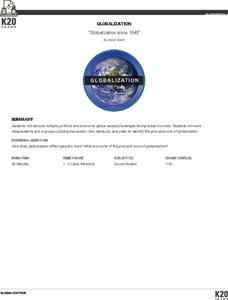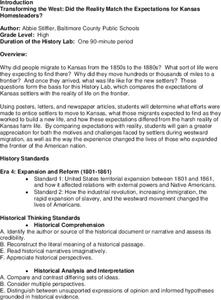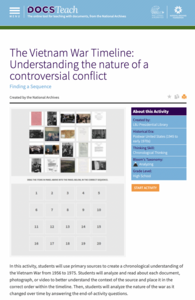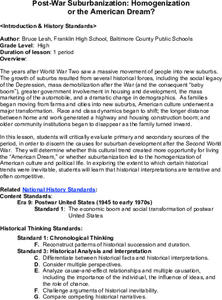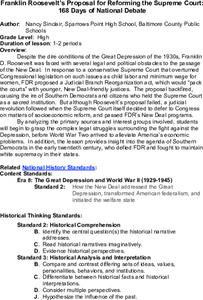K20 Learn
Building Arguments With Evidence Part 2: Constructing Arguments
New ReviewWhat is the biggest issue facing young people today? Class members consider the question—along with other provocative pieces from the New York Times—and then try to write their own arguments and back them up with evidence. Once complete,...
National Park Service
Adeline Hornbek and the Homestead Act: A Colorado Success Story
New ReviewStudents examine how the Homestead Act impacted the economic opportunities of women. They research the Homestead Act, define Manifest Destiny, and prepare an exhibit featuring an outstanding woman living in their community.
Carolina K-12
Introduction to the Holocaust
Young historians gain a well-rounded insight into the tragedy of the Holocaust by exploring pre-war Jewish life, reading and discussing survivor testimonies, and illustrating their understanding by using their own words and those of a...
K20 LEARN
Ancient Philosophy: Greeks or Romans?
While often not recognized, the ideas of ancient Greek and Roman philosophers still echo today. Using a series of videos and graphic organizers, individuals explore how ancient Greeks and Romans have influenced current Western political...
K20 LEARN
Globalization Since 1945
Using sources from various publications and a series of videos, pupils consider the global economy and the positive and negative effects of globalization. With a jigsaw discussion and a writing assignment, scholars weigh in on whether...
K20 LEARN
But What About Me?: Teaching Perspective In The Social Studies Classroom
How would the story of the discovery of America be different if indigenous people told it through their eyes? Individuals compare the conventional account of this moment in history to an account given by one of the native peoples. After...
K20 LEARN
Electoral College: Does My Vote Count?
How can a candidate get the most votes, yet still lose the race for the presidency? This is has happened more than once in American history, including in the elections of 2000 and 2016. Using an activity for creating group notes, young...
K20 LEARN
Plantation Life And Slavery: Antebellum Era
Learners evaluate primary sources from the antebellum era to determine the accuracy of textbooks. They examine narratives from enslaved people, then compare them to their own text. Extension activities include the opportunity to write a...
American Institute of Physics
African American Physicists in the 1960s
Physicists Herman Branson and Tannie Stovall provide young scholars with two very different perceptions of the status of African American physicists in the 1960s. After reading and comparing the bios of these two men, class members read...
American Institute of Physics
Physicist Activist: Dr. Elmer Imes and the Civil Rights Case of Juliette Derricotte
Elmer Imes was not only a brilliant physicist but also a civil rights activist. After an introductory lecture, groups read two articles about a traffic accident that killed one Fisk University student and injured several others. The...
American Institute of Physics
African Americans in Astronomy and Astrophysics
A two-part lesson focuses on the contributions to the fields of astronomy and astrophysics of two African Americans: Benjamin Banneker and Dr. George Carruthers. In part one, scholars learn about Benjamin Banneker by examining his...
National Park Service
Remembering Pearl Harbor: The USS Arizona Memorial
Young historians use primary source materials to investigate the 1941 attack on Pearl Harbor and the sinking of the USS Arizona. After reading background articles and studying maps and images of the attack, class members consider whether...
Center for History Education
U.S. Foreign Policy and the Iran-Contra Affair: Was Oliver North a Patriot, a Pawn, or an Outlaw?
If you had to write a song about Oliver North, would it be a ballad or a dirge? If you had to put him on a trading card, would he be a hero or the bad guy? Young historians decide for themselves after examining documents from the...
Center for History Education
Cold War Case Files: The Rosenberg Trial - Was Justice Fairly Served?
The Rosenbergs—executed for their role in a Soviet-era spy ring—continue the captivate the American imagination. Using a history lab format, young historians examine the trove of documents associated with the case, including photographs...
Center for History Education
To What Extent Were Women's Contributions to World War II Industries Valued?
Women rose to the challenge when the nation's war effort called them—but were sent home when the GIs came back from World War II. Young historians consider whether the United States valued women's contributions during the war using a...
Center for History Education
Guatemalan Coup of 1954: How Did the Cold War Influence American Foreign Policy Decisions?
Was it all about the bananas—or the fear of a communist threat? Young historians use a history lab to examine documents from the American-led 1954 Guatemalan coup. Using graphics, government documents, and speeches, they examine the...
Center for History Education
The Triangle Shirtwaist Factory Fire: Is Anyone to be Punished for This?
The stories of bodies falling to the pavement and girls dying in their seats echo to the present day. The New York City Triangle Shirtwaist Factory fire—which killed 147 people, mostly young women and girls—galvanized the labor movement...
Center for History Education
Transforming the West: Did the Reality Match the Expectations for Kansas Homesteaders?
They expected good soil and hearty crops ... but they found buffalo chips and grasshopper plagues. Using an advertisement encouraging famers to go west, budding historians examine primary sources including letters, photographs, and...
The Formation of the Western Alliance, 1948–1949
Silence is golden—even when debating post World War II foreign policy. Using a silent debate format, young historians deliberate whether the United States should have kept a foothold in West Germany after World War II. A series of videos...
PBS
Decoding Media Bias
Alternative facts? After watching the We The Voters film, "MediOcracy," viewers compare how cable news outlets CNN, Fox News, and MSNBC report the same story about politics or public policy. After a whole-class discussion of their...
DocsTeach
The Vietnam War Timeline: Understanding the Nature of a Controversial Conflict
The story of the Vietnam War is often told through images. Young historians analyze images and primary sources —including the Vietnamese Army's Seven Commandments poster and photos of the daily life of soldiers—to construct a timeline of...
Center for History Education
Post-War Suburbanization: Homogenization
The results of World War II made waves all the way to suburban life today. Examine the flight from the cities using images and documents from the 1950s building boom, including a quote analysis and political cartoons. The resource...
Center for History Education
Continuity or Change? African Americans in World War II
While World War II was a pivotal moment in history, historians debate its importance to the civil rights movement. Class members consider the implications of segregation and the war using a series of documents and a jigsaw activity....
Center for History Education
Franklin Roosevelt's Proposal for Reforming the Supreme Court: 168 Days of National Debate
Was it overreach or wise executive functioning? Scholars have long debated Franklin Roosevelt's court-packing scheme when he attempted to stack the court with justices friendlier to his New Deal measures. Now, learners pick up the...






